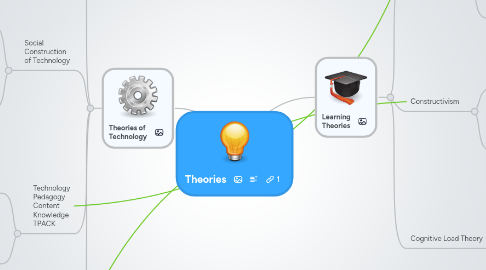
1. Theories of Technology
1.1. Media Ecology
1.1.1. Principles
1.1.1.1. Study of media as an environment
1.1.1.2. How media influences our perceptions
1.1.1.3. Idea that media ties together world views
1.1.1.4. Idea we are influenced by media and it governs our actions
1.1.2. Implications
1.1.2.1. Using media to show students ideas and events from other places in the world
1.1.2.2. Help relate with students as they are ever involved in different media
1.2. Social Construction of Technology
1.2.1. Principles
1.2.1.1. Human action influences technology *Opposite idea of media ecology
1.2.1.2. Way different technologies are used depend on social world at that time
1.2.1.3. Depends also on groups and stakeholders supporting said technology
1.2.2. Implications
1.2.2.1. Allows students to look into society at the time of new technology to see why some worked and some did not
1.2.2.2. Generate ideas of new technology based on current social views
1.3. Technology Pedagogy Content Knowledge TPACK
1.3.1. Principles
1.3.1.1. Making a connection between Technology, Pedagogy and Content
1.3.1.2. Concentrates on the knowledge found where these 3 ideas meet
1.3.1.3. True integration is knowing and understanding these connections
1.3.2. Implications
1.3.2.1. Helps create a framework for the teacher
1.3.2.2. Allows for more creativity in classroom setting
1.4. Philosophy of Teachnology
1.4.1. Principles
1.4.1.1. Is the teachers own belief of using technology in their teaching
1.4.1.2. Takes the teachers personal teaching philosophy and integrates technology
1.4.2. Implications
1.4.2.1. Allows teacher to tailor their own use of technology to what they are comfortable with
1.4.2.2. Allows teacher to vary the technology they bring to the classroom based on what is needed at that time
2. Learning Theories
2.1. Connectivism
2.1.1. Principles
2.1.1.1. Values ability to make connections over understanding of a single concept
2.1.1.2. Building and maintaining connections is a staple
2.1.1.3. Thinking and emotions are integral parts of the learning experience
2.1.2. Implications
2.1.2.1. Using professional networks to expand knowledge contacts
2.1.2.2. Using debating to gain and expand on knowledge
2.2. Constructivism
2.2.1. Principles
2.2.1.1. Human learning is built upon prior knowledge
2.2.1.2. Active learning process, student must participate
2.2.1.3. Experiences are key to this theory of learning
2.2.2. Implications
2.2.2.1. Using projects that connect prior learning
2.2.2.2. Group work and interaction
2.3. Cognitive Load Theory
2.3.1. Principles
2.3.1.1. Mind as a structure with working memory, long term memory and schema
2.3.1.2. Limited space in working memory, so it must be transferred to long term
2.3.1.3. Working memory builds schema to place knowledge in long term
2.3.2. Implications
2.3.2.1. Organizing material beforehand into groups
2.3.2.2. Using visual aids and uncomplicated ideas to help present knowledge
